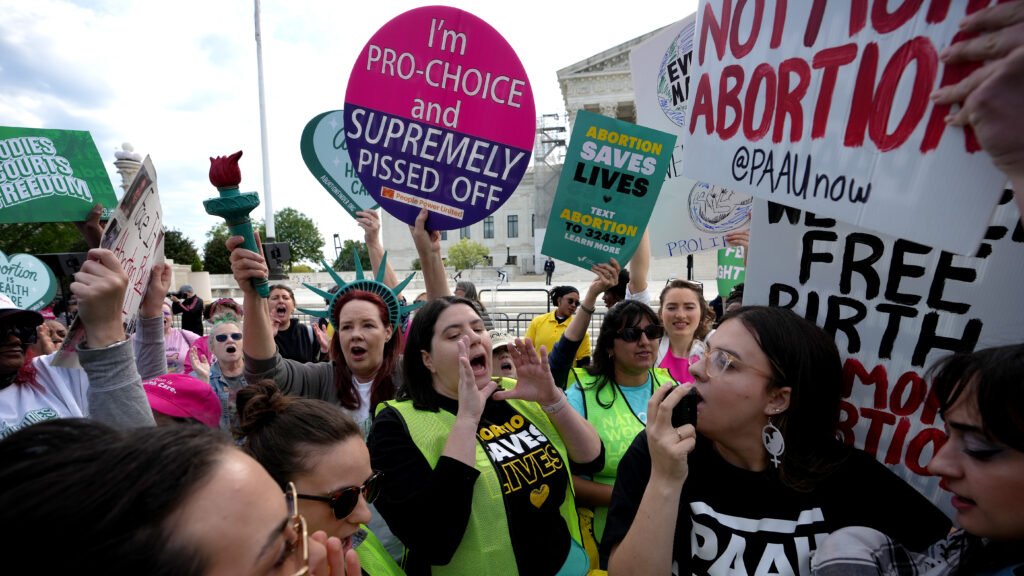WASHINGTON — Nearly two years after the Supreme Court overturned Roe v. Wade, justices are wrestling with a litany of state abortion restrictions, and whether they undercut federal law.
The latest abortion battle before the court centers on national requirements that doctors do everything they can to stabilize an emergency room patient, including performing an abortion if necessary. The Biden administration sued Idaho in the months after the court’s Dobbs decision in 2022, arguing the state’s new abortion ban clashed with the requirements of the Emergency Medical Treatment and Labor Act (EMTALA).
advertisement
Those emergency care requirements have become a linchpin in the Biden administration’s efforts to fortify abortion protections as 22 states enact restrictions, including 14 near-total bans.
After a state court sided with the federal government, Idaho appealed the ruling, arguing that its emergency care law was enacted to bar hospitals from turning away or transferring unwanted patients, not to implement national care standards.
Wednesday’s arguments come roughly a month after the Supreme Court questioned whether anti-abortion health care practitioners could sue to limit access to the abortion medication mifepristone.
advertisement
The crux of the latest case focuses on instances in which pregnancy is life-threatening or permanently damaging for the parent. Biden administration lawyers argued that Idaho’s narrow definition has left doctors in fear that they will be penalized — and face two to five years in prison — for performing abortions that state prosecutors could later argue were not necessary to save a patient.
In the time since Idaho enacted the near-total ban, one of the state’s largest hospitals has airlifted at least six women with serious complications to neighboring states to avoid that scenario, according to court documents.
“It’s become [that] ‘transfer’ is the appropriate standard of care in Idaho, but it can’t be the right standard of care to force somebody onto a helicopter,” said Justice Elena Kagan, an Obama administration appointee to the court. Kagan and Sonia Sotomayor, another Obama-selected judge, largely dominated the questioning of Idaho’s lawyer, Josh Turner.
Sotomayor asked Turner whether Idaho’s law would prohibit a doctor from performing an abortion if patients would have serious medical complications but would not lose their life.
“Yes, Idaho law does say that abortions in that case aren’t allowed,” he said.
However, conservative justices largely seemed skeptical of the federal government’s argument and questioned the difference between national requirements to stabilize a patient and Idaho’s strict law.
If there is no difference, “why are you here?” Justice Amy Coney Barrett asked Turner.
Justice Samuel Alito repeatedly highlighted the fact that the national law includes a ban on denying care for an “unborn child.”
Solicitor General Elizabeth Prelogar argued that language was meant to ensure pregnant people were not denied care, but “did nothing to displace the woman herself as an individual with an emergency medical condition.”
While the phrase “unborn child” has been used to prop up Idaho’s argument, it has had complicated implications for other states’ sweeping abortion restrictions. An Alabama ban on the procedure inadvertently made in vitro fertilization illegal because some embryos are destroyed in the process. Other states’ attempts at broadly applying fetal personhood laws have failed amid similar concerns.
Prelogar seemed to allude to this debate as she pointed out that in most of the life-threatening circumstances for the parent, the fetus is not yet viable.
At times, the debate in the courtroom mirrored the recent arguments about mifepristone access. Alito questioned whether individual doctors can object to performing abortions, even in life-threatening emergencies. (EMTALA does not require conscience objectors to do the procedure.) Objecting doctors in the mifepristone case claimed that they would be forced to aid with abortion complications if the drug is more readily available, an argument that did not seem to convince the court.
But this EMTALA lawsuit could institute a new national standard of care, Idaho’s lawyer argued.
“There are 22 states with abortion laws on the books,” he said. “This is not going to end with Idaho.”

